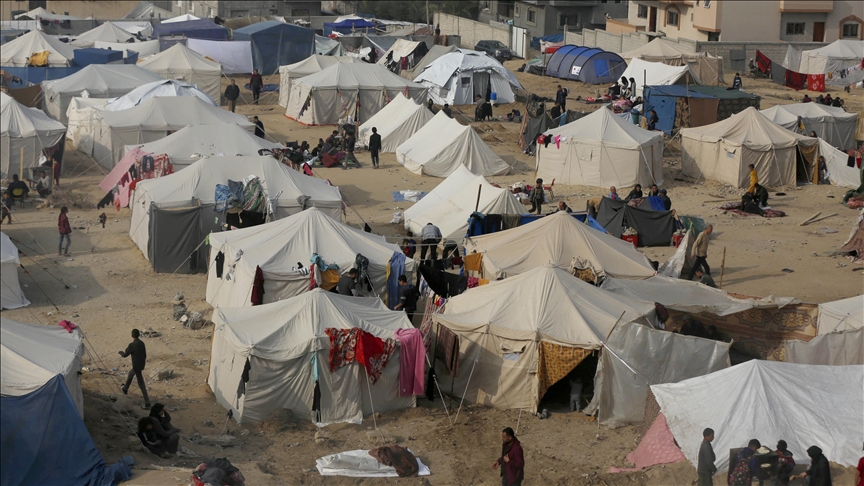

By Anadolu Agency
GAZA CITY, Palestine
“I hope to wake up from such a nightmare,” by these words, the fiftieth Palestinian Abo Ibrahim started his talk with Anadolu reporter, as he currently lives in a rickety tent in Rafah city, in the southern Gaza Strip.
Abo Ibrahim moved several times during the past 80 days of the Israeli deadly onslaught against Gaza before sheltering his family in a tent in Rafah city.
Abo Ibrahim, who preferred not to mention his name and to use his nickname instead, left his home in Abasan al-Kabira town, eastern Khan Younis city, under the Israeli heavy and devastating bombardment on his area.
His family depends on wood and paper to have a fire to cook food. “Look at my hands and my face; they are black from the fire and its smoke; we can’t find anything to cook except for wood pieces, nylons, and paper sheets, which pollute my hand and face and burn my eyes,” he said.
‘We know water and food are polluted but no alternatives’
Abo Ibrahim continues to say that even what they have of water and food is not healthy and probably polluted. They are forced to use them.
“We drink contaminated water, we know it is contaminated; we eat polluted food, and we know that because we cook it by using nylons and plastic bags with their black smoke that cover the food,” he said. “But we don’t have other choices; I have kids, and I have to feed them.”
“We live in a state of hysteria because of the inhuman conditions around us; we didn’t expect to go through such a nightmare,” Abo Ibrahim added.
He said at first, he and his family fled to a school in eastern Khan Younis city, then they moved again to central the city, and finally, they are now in Rafah city in a rickety tent.
“Every time the Israeli occupation bombs the area, we flee to and orders us to leave to another,” Abo Ibrahim noted.
He doesn’t know the fate of his home in Abasan al-Kabira town but hopes to return to it, “I hope to return to my house, and to leave such life of homelessness.”
“All world’s gold doesn’t replace returning home,” Abo Ibrahim said.
Homeless
In another place not far from the tent of Abo Ibrahim, Ahlam Shallah and her children live in a state of homelessness after she was forced to leave her shelter in the Nuseirat refugee camp, central the Gaza Strip.
“I am from Gaza City, but at the start of the war, I fled to the Nuseirat camp, and yesterday, the Israeli army ordered us to leave the camp towards Deir al-Balah or Rafah,” Ahlam said.
“We decided to go to the far south of the Strip, but we didn’t find a shelter; we are here without food, water, and even blankets,” she added.
Another Palestinian also described the same living conditions in Rafah amid a lack of food and shelter.
“I looked for a tent to shelter my children but didn’t find one; my child suffers a heart illness and can’t bear such conditions,” Hind Abdelnabi said.
Israel has pounded the Gaza Strip since a cross-border attack by the Palestinian group Hamas on Oct. 7, killing at least 21,110 Palestinians, mostly women and children, and injuring 55,243 others, according to local health authorities.
Around 1,200 Israelis are believed to have been killed in the Hamas attack.
Israeli attacks have left Gaza in ruins, with half of the coastal territory’s housing damaged or destroyed and nearly 2 million people displaced within the densely populated enclave amid acute shortages of food and clean water.
We use cookies on our website to give you a better experience, improve performance, and for analytics. For more information, please see our Cookie Policy By clicking “Accept” you agree to our use of cookies.
Read More